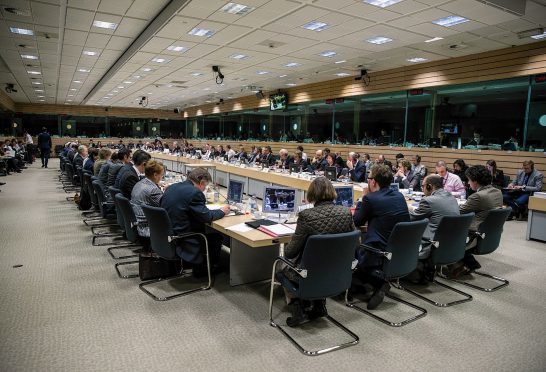Belgium – best known for its chocolates, beer, Poirot and the Smurfs – is gearing up for Christmas with heavily armed soldiers on the streets of its capital.
It was a strange atmosphere in Brussels for the Scottish contingent, including me, that was in town for the end of year fish talks this week.
The city has had more than a month to get used to heightened levels of security and its people hardly bat an eyelid any more at the highly visible military presence.
For the rest of us, it was a chilling reminder that Brussels was hone base for last month’s terror attacks in Paris.
Scottish Fishermen’s Federation chief executive Bertie Armstrong said: “I guess most of us were expecting this.
“In a normal year, it would never have crossed anybody’s mind that Brussels was a potential security hazard.
“There is a visible army presence, which is new for most of us who have only seen the odd armed policeman at UK airports.”
Fisheries Secretary Richard Lochhead said it created a “slightly strange atmosphere, compared to previous years,” adding: “They did their best to allow the talks to continue largely uninterrupted.”
This reporter’s efforts to take a sneaky photograph of one group of AK47- toting squaddies ended with a forceful request to delete the picture.
I have been covering the December Fisheries Council in Brussels 13 years on the trot.
While EU buildings were never the easiest of places to get into, it was a lot harder this year.
Scottish expat Andrew Bowie, who hails from Inverurie but has lived in Brussels since September, told me the initial security alerts the day after the Paris attacks were hard to believe.
“I went for a run the park that morning and it was quieter than in have ever seen,” the 28-year-old said, adding he and his wife, Madeline, also noticed a dearth of people at the supermarket.
By that Saturday night people started getting “edgy” but it was the next morning before the gravity of the situation started to hit home, he said.
Mr Bowie, who works as an assistant to Scots MP Ian Duncan in the European Parliament, said he then started to get texts with conflicting advice and rumours – about hotels being raided by the police, for example.
“It was all a bit crazy,” he said, adding that after an unplanned day off work he and many others in the city started going about their daily lives normally.
“But I never would have expected to go down the street and see soldiers carrying AK47s outside the shopping centre,” he said.
